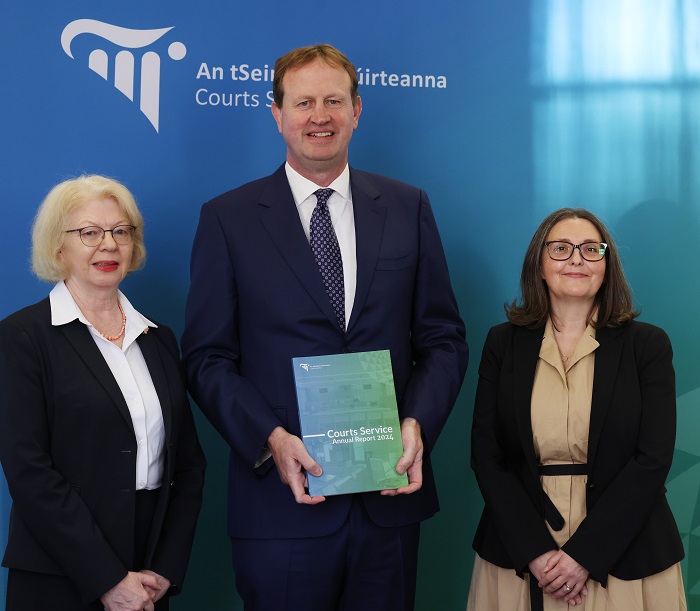Courts Service annual report for 2024 published
The 2024 Annual Report of the Courts Service, published today, reflects an ever-busy time for the courts. The Courts Service of 2024 is a radically changed organisation compared to when it was established in November 1999. In addition to meeting the everyday demands of a busy courts system, the report shows the Service and the Judiciary have embraced and led on many modernisation initiatives and changing workload.
Read the 2024 Annual Report: Annual Report 2024 (PDF)
Watch: Annual Report 2024 highlights video
The Minister for Justice, Home Affairs and Migration, Jim O’Callaghan, said:
“An independent and well-functioning courts service is, of course, imperative. An efficient legal system, which guarantees timely access to justice for all, is central to any civilised modern society... I want to emphasise that I, and my Department, are committed to ensuring adequate resources for the Courts Service, so that it can support the judiciary and provide an excellent service to all users of the courts... It is a priority of this Government to ensure that the courts are resourced to administer justice efficiently and effectively. To this end my Department aims to fill judicial vacancies at the earliest opportunity... This past year marks the first full calendar year of supporting a significantly enlarged judiciary and court operations... As committed to in the Programme for Government, an additional 20 judges will be appointed within the first 12 months of this Government’s tenure. It is my intention to ask the Judicial Appointments Commission to initiate the selection processes for these judges later this year... Taken together, these two sets of appointments will represent an increase of approximately 25% in the number of judges in Ireland.”
The Chairperson of the board of the Courts Service, Ms Justice Elizabeth Dunne, said of the report:
“This report reflects an ever-busy time for the courts. It gives a snapshot of the many areas of activity, showing improvements in the way matters are dealt with, together with changes in some areas of work such as reductions in some case types and increases in others on a year-on-year basis. Where possible, we track changes over several years and attempt to provide context for such changes in particular areas and years.”
“The report is basically a two-for-one offer – it reflects on efforts we have made to keep our courts accessible and more efficient, and shows how we organise a vast number of buildings, people and cases. It also provides a statistical overview of the case types which come before the courts and an insight into what we are asked to determine.”
Ms Justice Dunne said of the changes in 2024 regarding technology and digital improvements:
“The availability of video technology in courtrooms throughout the country provides the Judiciary, practitioners and their clients, our justice sector partners, and vulnerable users with improved options to enable cases to get on and be heard. 165 courtrooms are now video-technology enabled.”
Likewise, she noted that 95% of charge sheets are now processed electronically – with almost 121,000 sheets handled in 2024.
She said the report provides “further evidence of the efficiencies resulting from the appointment of additional judges – including the reduction in the number of courts cancelled due to insufficient judicial resources.”
Courts Service CEO, Angela Denning, said:
“New legislation impacts courts and court offices, providing challenges for staff as they, the Judiciary, legal practitioners and other court users get used to new practices and procedures. Such complex legislation is particularly challenging when demand is strong from commencement, for example with the Civil Orders against Relevant Conduct (commonly known as stalking or restraining orders), introduced in September 2024.”
In the first four months of operations, District Courts saw the following activity regarding restraining orders:
- 314 applications received;
- 133 full restraining orders granted;
- 107 interim orders granted.
At the end of 2024 we had achieved the first four years of our decade of modernisation and the potential of the transformation was becoming evident. Justice sector colleagues started to experience benefits in terms of improved datasets, operational efficiencies afforded by 165 technology-enabled courtrooms, and improved information for users.
A great source of pride last year was the Family Law Reform team winning a Civil Service Innovation and Excellence award for the comprehensive plain language family law information on courts.ie. Developed with the user, for the user, this information project won for “Citizen Impact and Customer Service.” Using the same approach, the Family Law Reform team moved their focus to District Court family law forms. The forms, which were trialled in 2024, received positive feedback from users: 60% reported that they were able to complete the forms themselves without having to retell traumatic stories to Courts Service staff. This project is going live nationwide in 2025 for all users.
Criminal case numbers
Improved disposal and resolution of cases across the system
390,158 new criminal matters were presented to the courts last year, an increase of 6.3% on the previous year. 356,045 cases were finalised, an increase of 5.2%.
Court of Appeal: 341 new criminal appeals las

